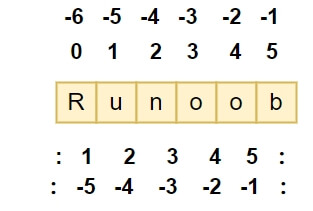Python Lists: Definitions, Operations, and Examples
Defining a List
>>> li = ["a", "b", "mpilgrim", "z", "example"] >>> li ['a', 'b', 'mpilgrim', 'z', 'example'] >>> li[1] 'b'
Negative Indexing in Lists
>>> li ['a', 'b', 'mpilgrim', 'z', 'example'] >>> li[-1] 'example' >>> li[-3] 'mpilgrim' >>> li[1:3] ['b', 'mpilgrim'] >>> li[1:-1] ['b', 'mpilgrim', 'z'] >>> li[0:3] ['a', 'b', 'mpilgrim']
Adding Elements to a List
>>> li ['a', 'b', 'mpilgrim', 'z', 'example'] >>> li.append("new") >>> li ['a', 'b', 'mpilgrim', 'z', 'example', 'new'] >>> li.insert(2, "new") >>> li ['a', 'b', 'new', 'mpilgrim', 'z', 'example', 'new'] >>> li.extend(["two", "elements"]) >>> li ['a', 'b', 'new', 'mpilgrim', 'z', 'example', 'new', 'two', 'elements']Searching in a List
>>> li ['a', 'b', 'new', 'mpilgrim', 'z', 'example', 'new', 'two', 'elements'] >>> li.index("example") 5 >>> li.index("new") 2 >>> li.index("c") Traceback (most recent call last): File "<interactive input>", line 1, in ? ValueError: list.index(x): x not in list >>> "c" in li FalseRemoving Elements from a List
>>> li ['a', 'b', 'new', 'mpilgrim', 'z', 'example', 'new', 'two', 'elements'] >>> li.remove("z") >>> li ['a', 'b', 'new', 'mpilgrim', 'example', 'new', 'two', 'elements'] >>> li.remove("new") # Removes the first occurrence >>> li ['a', 'b', 'mpilgrim', 'example', 'new', 'two', 'elements'] # Second 'new' is not removed >>> li.remove("c") # Raises an exception if the value is not found Traceback (most recent call last): File "<interactive input>", line 1, in ? ValueError: list.remove(x): x not in list >>> li.pop() # Removes and returns the last element 'elements' >>> li ['a', 'b', 'mpilgrim', 'example', 'new', 'two']List Operators
>>> li = ['a', 'b', 'mpilgrim'] >>> li = li + ['example', 'new'] >>> li ['a', 'b', 'mpilgrim', 'example', 'new'] >>> li += ['two'] >>> li ['a', 'b', 'mpilgrim', 'example', 'new', 'two'] >>> li = [1, 2] * 3 >>> li [1, 2, 1, 2, 1, 2]
Using
jointo Convert a List to a String>>> params = {"server":"mpilgrim", "database":"master", "uid":"sa", "pwd":"secret"} >>> ["%s=%s" % (k, v) for k, v in params.items()] ['server=mpilgrim', 'uid=sa', 'database=master', 'pwd=secret'] >>> ";".join(["%s=%s" % (k, v) for k, v in params.items()]) 'server=mpilgrim;uid=sa;database=master;pwd=secret'Note:
joincan only be used with lists of strings; it does not perform any type conversion. Attempting to join a list with non-string elements will raise an exception.Splitting a String into a List
>>> li = ['server=mpilgrim', 'uid=sa', 'database=master', 'pwd=secret'] >>> s = ";".join(li) >>> s 'server=mpilgrim;uid=sa;database=master;pwd=secret' >>> s.split(";") ['server=mpilgrim', 'uid=sa', 'database=master', 'pwd=secret'] >>> s.split(";", 1) ['server=mpilgrim', 'uid=sa;database=master;pwd=secret']splitis the opposite ofjoin; it splits a string into a list of elements. Note that the delimiter (";") is completely removed and does not appear in the resulting list. The optional second parameter specifies the number of splits to make.List Comprehension
>>> li = [1, 9, 8, 4] >>> [elem * 2 for elem in li] [2, 18, 16, 8] >>> li [1, 9, 8, 4] >>> li = [elem * 2 for elem in li] >>> li [2, 18, 16, 8]
Dictionary Operations
>>> params = {"server":"mpilgrim", "database":"master", "uid":"sa", "pwd":"secret"} >>> params.keys() dict_keys(['server', 'database', 'uid', 'pwd']) >>> params.values() dict_values(['mpilgrim', 'master', 'sa', 'secret']) >>> params.items() dict_items([('server', 'mpilgrim'), ('database', 'master'), ('uid', 'sa'), ('pwd', 'secret')]) >>> [k for k, v in params.items()] ['server', 'database', 'uid', 'pwd'] >>> [v for k, v in params.items()] ['mpilgrim', 'master', 'sa', 'secret'] >>> ["%s=%s" % (k, v) for k, v in params.items()] ['server=mpilgrim', 'database=master', 'uid=sa', 'pwd=secret']Filtering Lists
>>> li = ["a", "mpilgrim", "foo", "b", "c", "b", "d", "d"] >>> [elem for elem in li if len(elem) > 1] ['mpilgrim', 'foo'] >>> [elem for elem in li if elem != "b"] ['a', 'mpilgrim', 'foo', 'c', 'd', 'd'] >>> [elem for elem in li if li.count(elem) == 1] ['a', 'mpilgrim', 'foo', 'c']

